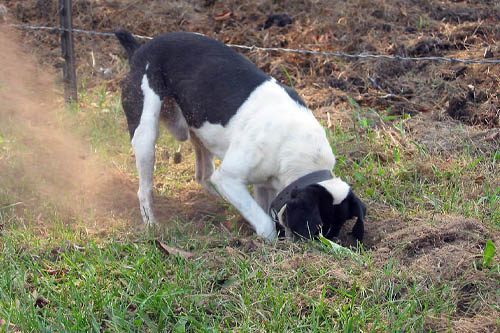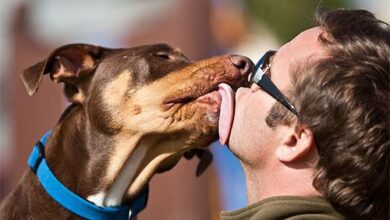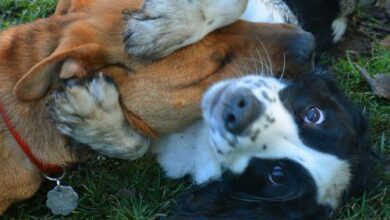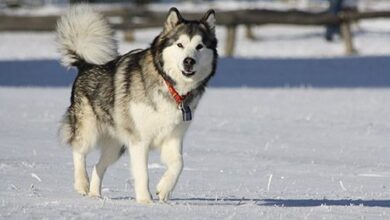5 Solutions for dogs digging holes in your yard


Spring has arrived, the sun and the heat are also there, so what could be better than finally enjoying our land, well installed with Fido to keep us company. The snow in some areas is almost all melted, giving way to grass that is starting to wake up and grow. We are starting the scraping of the land and the clearing of the flowerbeds.
Our dog, who used to frolic on the high snowbanks and smell the smells through them, now discovers a whole new universe of smells well buried in the ground. He hears certain noises and for him, digging the ground is completely natural.
Although our faithful companion finds incredible pleasure in making our land a real minefield, for us it is something else entirely. We who have put so much effort into maintaining our lawn, our flowerbeds and our garden area, in no time at all, Fido will have destroyed everything!
Because it is important to understand that each behavior has a function, here are the 5 most common causes that explain why a dog digs, as well as my recommendations to modify and prevent this behavior according to each of them.
1- It’s a genetically programmed behavior
The digging behavior in dogs is a completely natural activity. All dogs can dig the earth full of smells and noises. There are also certain breeds of dogs that are more predisposed such as the Jack Russel Terrier and Dachshund.
Even though our dogs now have food every day without really having to work to get it, even though they will never run out of food day after day, some dogs still have a genetic need to hide food. They will bury bones and kibble all over the field.
Recommendations: Vigilance is required, it will be much easier for you to stop an intention rather than a behavior. Also, the more your dog has the chance to do the behavior, the more he will be reinforced to do it, the more he will want to reproduce it. Anticipate their behavior, meet their needs and redirect their intentions towards the right actions.
2- He is bored and has too much energy
A dog left alone in the field with no occupation (toys or chewing bones) will quickly find something interesting to do. Digging up roots, finding bits of wood buried in the ground are all very fun activities for our companions. In addition, if your dog is used to seeing you digging in your flower beds, he could have fun doing it too!
Recommendations: Good news! If your dog digs out of boredom or because he has a lot of energy, this behavior will be easy for you to change. You just have to offer him interesting occupations on the ground. Obviously, at the beginning never leave him alone on the ground, you must watch him and keep him busy. Make sure his exercise needs are met. A good walk a day will help a lot. Play with him, you can throw him the ball, play with a frisbee, do an agility course and even do some scent hunting. To satisfy his need to chew, you can prepare toys for him with treats inside and even make ice cubes with small pieces of frozen liver in them.
If you leave him alone on the ground, because you are busy with something else, still watch him regularly to make sure he does not divert his attention from his bone to go digging. Also, it is better to avoid making your flowerbeds in front of your dog who could be tempted to imitate you!
3- He wants to run away
Eh yes ! Even if your yard is fenced, the call for freedom can be very strong in some dogs who will find a way to dig a small space under the fence in place to be able to get out of the field.
Recommendations: What interests and motivates your dog so much outside of your property. Other dogs, adults, children? Perhaps your companion means to you by this behavior that he needs to go out more, take walks, socialize with his congeners. The courtyard of a house will never replace a long walk for your companions do not forget it. You could take him for a longer and regular walk in new places and why not in the woods in the middle of nature. He will be able to dig as he pleases!
Think about it! If your dog tends to dig to escape, make sure he has a microchip and a well-identified tag. You are responsible for the actions your dog does, if he hurts another dog or a person during his getaway you will be held responsible. So it is important to make sure that your yard is safe: inspect all the corners of your land and identify the places through which it could pass (where the earth is lighter and less dense). Install a higher fence, a chicken wire buried in the ground, put bricks or large stones in the ground under your current fence, etc.
4- He looks for smells and the source of certain noises
We know that the dog’s sense of smell is very developed and the earth is crawling with rodents moving around in the ground: it makes little noises and there are a lot of smells. Earthworms, insects, larvae and many more are all sources of smells and interesting noises for your dogs to discover.
Recommendations: Learn the Requests: Do Not Touch and Call Back. If you see he’s picked up the scent of small prey or something, ask him to leave and come back to you, then redirect his behavior to something interesting.
5- Wants coolness and humidity
During very hot outside temperatures, the dog can dig the ground in order to seek a little freshness to help him regulate his temperature.
Recommendations: In hot weather, think about his comfort and offer him a place in the shade with water available at all times. You can also install a small children’s pool filled with water for him to lie down in. There are also cooling mats that are great for the dog.
Prepare frozen treats to offer him in hot weather. Nothing could be simpler: in an ice cube tray, fill the spaces with unsalted chicken or beef broth and put a treat in the bottom (beef liver, chicken heart, etc.). Put the whole thing in the freezer for the night and give it to him from time to time when it is hot. Another bigger version is to take a plastic dish, fill it with a toy such as your favorite ball and some candies, fruits and vegetables and fill the bowl with water. Then we freeze and give it outside in hot weather!
Reward good behavior
Don’t wait for your dog to produce bad behavior to change it. If he’s playing with those toys in the yard, if he’s relaxed and not digging, praise him. Show him that you are happy when he behaves well, he will be more likely to want to reproduce it: this is the very principle of positive reinforcement.
For those who would like to meet the genetic needs of their dog and offer them a small piece of land with the possibility of digging as they please in this place, this is quite possible! You can mix some dirt with sand and make a small defined space with rocks. Sandboxes for the kids or a small pool filled with soil are also great as small digging spots. You will have to train it to go there to dig, it will take time and patience. You can also encourage and reward him if he goes on his own and to encourage him to go, bury interesting bones or even stuffed Kongs there without his knowledge. Also, if it digs elsewhere, you will need to constantly redirect it to the correct area.
What if you catch him in the act?!?
You may be tempted to argue with your dog for digging in front of you, but be careful, this won’t fix behavior that is driven by a need that isn’t met by you. This behavior for the dog is natural and has a function, it is up to you to find the cause and remedy it. Moreover, as we have already explained in a previous article on the consequences of training in punitive methods, punishing a dog will make you unpredictable, the dog could be afraid of you and do the behavior out of your sight.
You can redirect his behavior to a nearby toy, give him a bone to chew on, throw the ball at him to distract him, etc.
If you have a spot on the yard where your dog can dig, simply redirect him to the right area and encourage him to dig there.
Conclusion
In conclusion, each behavior has a function and knowing it will greatly help you to modify the actions of your companion.
Do you need help with your dog’s behavior? Contact me, it will be my pleasure to help you with an individual consultation.





